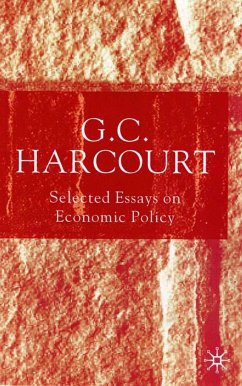This volume contains classic essays on economic policy written by one of its great exponents. The opening essay traces the author's evolving structures of thought about economics and the policy proposals that came from them over this period. Section 2 contains essays which set the background to the policy recommendations. In section 3 the role of investment incentives is analysed. Section 4 is concerned with the influence of accounting conventions on private decision-making and government policy in both capitalist and planned economies. Section 5 contains a number of package deals, all designed to fit within the constraint of the philosophy of governments in power. The last section, general essays, ranges from a scheme for the payment of prisoners to the celebration of the views on policy of great economists, from Colin Clark, through Nicky Kaldor to John Cornwall.
Hinweis: Dieser Artikel kann nur an eine deutsche Lieferadresse ausgeliefert werden.
Hinweis: Dieser Artikel kann nur an eine deutsche Lieferadresse ausgeliefert werden.








